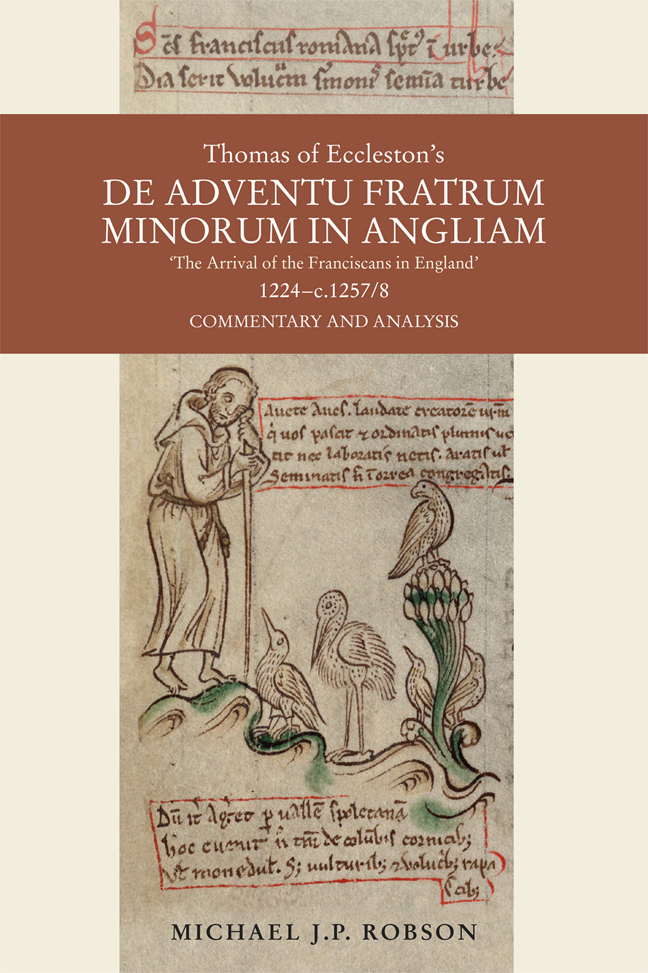Book contents
- Frontmatter
- Dedication
- Contents
- Acknowledgements
- List of Abbreviations
- Timeline
- Introduction
- 1 The launching of the mission to England
- 2 The first foundations
- 3 The admission of novices
- 4 The growth of the Franciscan community
- 5 The fervour of the early friars
- 6 The office of preaching
- 7 The seven custodies
- 8 The three general visitators
- 9 The Irish and Scottish provinces
- 10 The relocation of friaries and their enlargement
- 11 The friars’ schools of theology
- 12 The confessors
- 13 The ministers general
- 14 The ministers provincial
- 15 A gallery of friars
- A post script
- Bibliography
- Index
- Miscellaneous Endmatter
1 - The launching of the mission to England
Published online by Cambridge University Press: 02 March 2024
- Frontmatter
- Dedication
- Contents
- Acknowledgements
- List of Abbreviations
- Timeline
- Introduction
- 1 The launching of the mission to England
- 2 The first foundations
- 3 The admission of novices
- 4 The growth of the Franciscan community
- 5 The fervour of the early friars
- 6 The office of preaching
- 7 The seven custodies
- 8 The three general visitators
- 9 The Irish and Scottish provinces
- 10 The relocation of friaries and their enlargement
- 11 The friars’ schools of theology
- 12 The confessors
- 13 The ministers general
- 14 The ministers provincial
- 15 A gallery of friars
- A post script
- Bibliography
- Index
- Miscellaneous Endmatter
Summary
Unlike the Benedictine monks, who remained within their cloisters, and the Cistercians, who settled in remote and isolated locations, the friars inhabited a universal cloister. Their mandate was global, taking them wherever people went, sometimes deep into missionary territory beyond the confines of the western Church. Their route to salvation was through ministering to their neighbours, whether in a hospital, at the king’s court, a prison, a school, a parish, a university or missionary territory, in accordance with the twelfth chapter of their Rule (Regula bullata). They served the residents of the English cities and towns and assisted them in multiple ways, promoting reconciliation and peace and applying the Gospel to the circumstances of daily life. They were ubiquitous and conducted an apostolate in the towns and villages several miles distant from their friaries. They were instantaneously recognizable by their religious habit, cord and bare feet. In a society where dress denoted status and wealth, their religious habit and demeanour reflected their commitment to humility and evangelical poverty and it became their passport as they crossed regional and national borders. The order was cosmopolitan in nature, with friars moving between one jurisdiction and another with ease to discharge the business of their order, the crown or the papacy. They travelled only with permission and for legitimate reasons and then with a companion (socius). They were unfettered by the confines of a town, a parish, a deanery, an archdeaconry, a diocese or a country. The order had already expanded throughout the Italian peninsula and thence into France, Germany, Hungary, Portugal, Spain and the Holy Land before it reached England, Ireland and Scotland.
The preparations
Eccleston chronicles the deeds of the founding fathers of the English province and gives an account of the lives of some of the prominent figures. He was familiar with historical models and knew, for instance, the style of the Cistercian chronicles of the twelfth century. While the monks delighted in the topography of new sites, the friars had no such interest; instead, their focus was on their fraternity and ministry, generally on a provincial scale. Knowledge of the life and teaching of the visionary figure of St Francis was presupposed in the readers, who were already well acquainted with the early biographies, beginning with Thomas of Celano’s Vita prima Sancti Francisci, and then the Vita brevior, which was compiled in the 1230s, probably during the earlier part.
- Type
- Chapter
- Information
- Thomas of Eccleston's De adventu Fratrum Minorum in Angliam 'The Arrival of the Franciscans in England', 1224-c. 1257/8Commentary and Analysis, pp. 26 - 44Publisher: Boydell & BrewerPrint publication year: 2023



